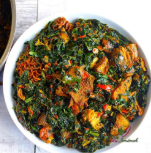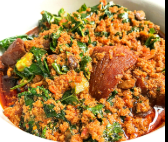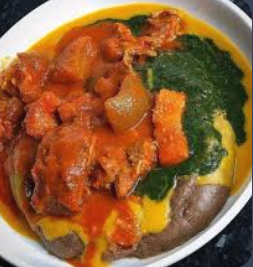TETE (Local Green Spinach) – per pack (Subscriber price only)
Description
Tete, also called African spinach or amaranth leaves, is native to Africa and Asia. It has been cultivated in Nigeria for centuries and is a staple green vegetable in many traditional dishes.
Sources
Oyo, Ogun
Health benefits
-
Rich in iron – helps prevent anemia and boost energy.
-
High in vitamins A and C – supports vision, immunity, and healthy skin.
-
Good source of dietary fiber – aids digestion and supports gut health.
-
Contains calcium – important for strong bones and teeth.
-
Low in calories – great for weight management.
Common soups you can use it for
-
Efo Riro (Yoruba vegetable stew)
-
Efo Elegusi (vegetable with melon seed soup)
-
Ogbono Soup (as an added leafy green)
-
Okra Soup
-
Mixed Vegetable Stew
Shoko -per pack (Subscriber price only)
Description
Shoko, also called Lagos spinach or celosia leaves, is a traditional Nigerian leafy vegetable native to tropical Africa. It is widely grown in Nigeria, particularly in the Southwest, and is prized for its slightly bitter taste which mellows when cooked.
Sources
Lagos, Ogun, Oyo, Osun, and Ondo states.
Health benefits
-
Rich in antioxidants – helps fight free radicals and support cell health.
-
High in vitamin C – boosts immunity and promotes wound healing.
-
Good source of folate – important for red blood cell production and pregnancy health.
-
Contains iron – supports blood health and energy levels.
-
Aids digestion – thanks to its dietary fiber content.
Common soups you can use it for
-
Efo Riro (traditional Yoruba vegetable stew)
-
Efo Shoko (Shoko-based vegetable sauce)
-
Egusi Soup (melon seed soup with greens)
-
Ogbono Soup
-
Okra Soup
Ugwu- per pack (Subscriber price only)
Description
Ugu (Telfairia occidentalis), known as fluted pumpkin leaves, is one of Nigeria’s most popular and nutritious vegetables. The leaves are tender, slightly sweet, and have a rich green color, often used fresh in soups, stews, and sauces. The seeds of the plant are also edible and can be roasted or used in traditional meals.
Sources
Edo, Delta, Anambra, Imo, Enugu, and Cross River states.
Health benefits
-
Rich in iron – helps prevent and treat anemia.
-
High in vitamins A and C – supports vision, skin health, and boosts immunity.
-
Good source of calcium – strengthens bones and teeth.
-
Improves blood production – boosts hemoglobin levels.
-
Supports reproductive health – traditionally believed to enhance fertility.
Common soups you can use it for
-
Edikang Ikong Soup
-
Egusi Soup
-
Vegetable Soup (mixed leaves)
-
Ogbono Soup
-
Okra Soup
Ewedu- per pack (Subscriber price only)
Description
Ewedu (Corchorus olitorius), also known as jute leaves, is a slimy, green leafy vegetable that is a staple in Yoruba cuisine. When cooked, it has a slippery texture, similar to okra, which makes it easy to swallow. The leaves are usually blended or whisked after boiling to achieve a smooth, viscous consistency. Ewedu is prized for its unique taste and texture, as well as its rich nutritional value.
Sources
Primarily cultivated in the southwestern states of Nigeria but also grown in other regions with warm, moist soil. It is commonly sold fresh in open markets and can also be home-grown in backyard gardens.
Health Benefits
-
Rich in vitamins A, C, and E, which promote good eyesight and healthy skin.
-
Supports digestion due to its mucilaginous (slimy) texture.
-
Boosts immunity and helps fight infections.
-
Promotes bone and teeth health with its high calcium content.
-
Aids postpartum recovery in women.
Common soups or dishes you can use it for
-
Ewedu soup (often served with amala and gbegiri)
-
Ewedu with stew and assorted meats
-
Mixed vegetable soups with okra
-
Ewedu with melon (egusi) combination soups









